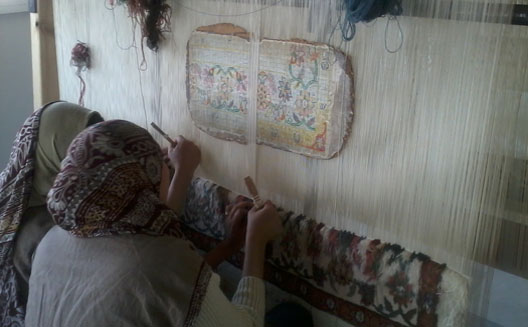Textile Training Helps Women Out of Poverty at Artistry Egypt


Women in Cairo don't have it easy under the new regime, but a
new non-profit is offering artisan training to those in low-income
communities, in hopes of offering new opportunities.
Artistry Egypt recently launched to train women on how to make
handmade carpets and high quality eco-friendly textiles.
“The purpose of this project is to address poverty through
capacity-building, while encouraging other NGOs to consider
entrepreneurship to reach their goals”, says Rasha Zeki,
Development Manager at Gannat El
Khulood, which is managing the project.
By combining a commercial and social impact element, the project,
which was a semi-finalist at the MIT Enterprise
Forum Arab Business Plan Competition last year, seeks
to address local poverty among female youth who are often
unqualified to enter the regular work force. Participants are
trained for 12 months to make handmade products.
It's already gaining momentum. During its first round of
training, during the last week of February this year, Artistry
Egypt trained 22 women aged 19 and above, who live in Al Doweika
and Manshiyat Naser, two low-income neighborhoods in Cairo, where
illiteracy among women can reach 59%.
Becoming Sustainable
Now that it's launched and operating, the next item on the
agenda is generating a sustainable revenue model.
For now, the organization is planning a 3-year program. During the
first year, it will train 200 girls who will be hired as
professional craftswomen with full salaries over the next two
years. It will bring in specialized craftspeople to conduct the
initial trainings, subject to periodic evaluation;
participants must be committed.
If Artistry Egypt is able to raise enough
funds, they hope to continue the project beyond these 3 years.
Their current plans are to raise money through cash donations, but
later hope to begin selling the handmade products to cover costs
and pay each trainee’s salary. To create a well-rounded
program, the NGO will also offers social services that target
trainees' personal development and entrepreneurship education.
Yet without textiles to sell for at least a year, the project needs
to find a realistic way to stay afloat.
While Artistry Egypt will likely remain a non-profit, like its parent organiztion, it ultimately hopes to transition to a social entreprneurship model, to become self-sustainable as it provides program participants with a steady source of income.


